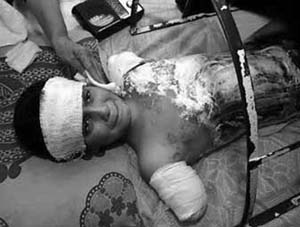|
For Iraqis, Devastation,
|
 |
|
Twelve-year-old Ali Ismaeel Abbas lost his arms and 15 relatives in the U.S. bombing. He asked an American reporter, "So this is what you meant when you said you were coming to free us?" |
On March 28 a massive explosion at a market in Baghdad's crowded al-Shu'la neighborhood killed at least 62 people. A distraught mother, Sumaya' Abed, said shards of shrapnel had cut through the chests and heads of her three sons, killing them all. The youngest was just 11 years old.
Both the U.S. and the U.K. blamed the deaths on aging Iraqi anti-aircraft missiles. But the BBC reported that shrapnel found at the bombing site showed the serial number of the bomb. This identified it as a U.S. anti-radar missile manufactured in Texas by Raytheon and sold to the U.S. Navy.
Extensive U.S. air strikes in or near Iraqi residential areas have maimed and killed thousands of civilians, including children. They have destroyed homes and livelihoods. They have deprived millions of Iraqis of clean water, electricity and health care, jeopardizing the lives of thousands long after the bombardment stops.
Though many Iraqis welcome the end of the oppressive Baa'th regime, the suffering inflicted upon them by the current war, the first Gulf War and 12 years of U.N. sanctions has turned many Iraqis against the U.S. Surprisingly, tens of thousands have publicly demonstrated against the U.S. occupation. According to the London Guardian, the U.S. military killed at least 17 protesters and injured more than 100 in the northern city of Mosul alone.
The U.S. unleashed thousands of bombs and cruise missiles on Iraq, more than 20 times the total number used in the 1991 Gulf War.
On April 6 Ali Ismaeel Abbas, 12, was asleep when a U.S. missile obliterated his home in Diala Bridge district east of Baghdad. His father, pregnant mother, brother and 12 other relatives died in the attack. The attack left him without his lower arms and his chest, abdomen and groin badly burned.
"Why did you do this to me?" Ali asked one American reporter. "I need my arms. I feel terrible pain, all the time. Even a mountain can't stand that much pain. So this is what you meant, when you said you were coming to free us?"
The Red Cross reported on April 7 that casualties were overwhelming Baghdad hospitals. The flow of injured at some hospitals reached 100 people per hour. ICU ventilators, intravenous fluids, antibiotics and basic equipment were in short supply. U.S. forces allowed looters to steal millions of dollars of needed supplies from the Ministry of Health.
The Anglo-American siege of urban areas in southern and central Iraq has severely damaged Iraq's infrastructure. It has disrupted water, electrical, sanitation and food distribution systems that sustain millions of civilians. These systems were already weakened by the 1991 Gulf War and punishing economic sanctions.
Aid agencies say Iraq is facing a humanitarian emergency. They warn that if these systems are not restored immediately, thousands of civilians could die from insufficient clean water, food or sanitation.
Retired Air Force Colonel Sam Gardner told ABC News on April 8 that between 15 and 20 million Iraqis had lost access to drinkable water. In Basra desperate Iraqis were forced to drink "garden water" normally used for irrigation-water unsafe to wash in, let alone drink. With summer approaching, when temperatures often exceed 120 degrees, the likelihood of water-borne disease epidemics is alarmingly high. Cholera has already broken out in Basra.
Due to sanctions, 60 percent of Iraqis (16 million people) depend for survival on monthly food rations distributed by government and humanitarian agencies. Reports indicate that the war has collapsed this food distribution system. The head of the U.N. World Food Program said he feared that Iraq's 27.1 million people could exhaust Iraqi food reserves by early May.
Iraqi challenges to the U.S. presence are mounting. On April 13, 20,000 Shia Muslims protested against U.S.-led government talks in Nasiriyah. On April 18, tens of thousands marched through downtown Baghdad carrying banners declaring, "Leave our country" and "No Bush, No Saddam."
"If Americans and British are here to destroy the regime and liberate Iraq, we welcome them,'' said Emad Fadil, a 26-year-old worker in the southern city of Basra. "But if they come to occupy Iraq, we will fight them to the end--like the Palestinians.''
Hany Khalil is coordinator for Racial Justice 9/11: People of Color Against the War and works with War Times in New York City.
| Month in Review |
|---|
|
August 2010: |
| PAST articles |
Detoit: I Do Mind Empire (USSF Recap) “Bring the War (English) Time for Rebirth: (English) War Weariness, Military Heft, and (English) The Global Military Industrial Complex (English) A Stalled (English) Bush's Iraq “Surge”: Mission Accomplished? Iran: Let's Start with Some Facts Nuclear Weapons Forever (English) Time to End the Occupation of Iraq First-Hand Report from the Middle East (English) Haditha is Arabic (English) A Movement to End Militarism From Soldier to Students Not Soldiers Israel's "Disengagement" U.S. Soldiers Torture: Help Stop Torture — Be All You Can Be: OCTOBER 2006
|
|
War Times/Tiempo de Guerras is a fiscally sponsored project of the |